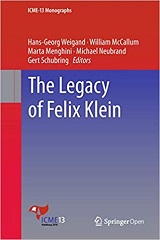
|
FreeComputerBooks.com
Links to Free Computer, Mathematics, Technical Books all over the World
|
|
- Title: The Legacy of Felix Klein
- Author(s) Hans-Georg Weigand, William McCallum, Marta Menghini, Michael Neubrand, Gert Schubring
- Publisher: Springer; 1st ed. 2019 edition; eBook (Creative Commons Licensed)
- License(s): Creative Commons License (CC)
- Hardcover/Paperback: 232 pages
- eBook: PDF and ePub
- Language: English
- ISBN-10/ASIN: 3319993852
- ISBN-13: 978-3319993850
- Share This:

|
This open access book provides an overview of Felix Klein's ideas, highlighting developments in university teaching and school mathematics related to Klein's thoughts, stemming from the last century. It discusses the meaning, importance and the legacy of Klein's ideas today and in the future, within an international, global context.
The book shows that many of Klein's ideas can be reinterpreted in the context of the current situation, and offers tips and advice for dealing with current problems in teacher education and teaching mathematics in secondary schools. It proves that old ideas are timeless, but that it takes competent, committed and assertive individuals to bring these ideas to life.
Throughout his professional life, Felix Klein emphasised the importance of reflecting upon mathematics teaching and learning from both a mathematical and a psychological or educational point of view. He also strongly promoted the modernisation of mathematics in the classroom, and developed ideas on university lectures for student teachers, which he later consolidated at the beginning of the last century in the three books on elementary mathematics from a higher standpoint.
About the Authors- N/A
- Mathematicians and History of Mathematics
- Popular, Recreational, and Miscellaneous Mathematics
- Geometry and Topology
- Algebra, Abstract Algebra, and Linear Algebra
- Calculus and Mathematical Analysis
- Number Theory
 Similar Books:
Similar Books:
-
 Men of Mathematics: Great Mathematicians from Zeno to Poincaré
Men of Mathematics: Great Mathematicians from Zeno to Poincaré
This book provides a rich account of major mathematical milestones, from the geometry of the Greeks through Newton’s calculus, and on to the laws of probability, symbolic logic, and the fourth dimension.
-
 The Story of Euclid (W. B. Frankland)
The Story of Euclid (W. B. Frankland)
Euclid was a Greek mathematician, often referred to as the "Father of Geometry". His Elements is one of the most influential works in the history of mathematics, serving as the main textbook until the late 19th or early 20th century.
-
 Paul Lorenzen - Mathematician and Logician (G. Heinzmann, et al)
Paul Lorenzen - Mathematician and Logician (G. Heinzmann, et al)
This open access book examines the many contributions of Paul Lorenzen, an outstanding philosopher from the latter half of the 20th century. It features papers focused on integrating Lorenzen's original approach into the history of logic and mathematics.
-
 A Beautiful Math: John Nash, Game Theory, and a Code of Nature
A Beautiful Math: John Nash, Game Theory, and a Code of Nature
Today neuroscientists peer into game players brains, anthropologists play games with people from primitive cultures, biologists use games to explain the evolution of human language, and mathematicians exploit games to better understand social networks.
-
 Making up Numbers: A History of Invention in Mathematics
Making up Numbers: A History of Invention in Mathematics
The book explains how conceptual hurdles in the development of numbers and number systems were overcome in the course of history, from Babylon to Classical Greece, from the Middle Ages to the Renaissance, and so to the nineteenth and twentieth centuries.
-
 How We Got from There to Here: A Story of Real Analysis
How We Got from There to Here: A Story of Real Analysis
This book is an introductory real analysis textbook, presented through the lens of history. The definitions and techniques are motivated by the actual difficulties encountered by the intuitive approach and are presented in their historical context.
-
 Non-Euclidean Geometry: A Critical and Historical Study
Non-Euclidean Geometry: A Critical and Historical Study
This work has been selected by scholars as being culturally important, and is part of the knowledge base of civilization as we know it. This work was reproduced from the original artifact, and remains as true to the original work as possible.
-
 Mathematical Discovery (A.M. Bruckner, et al)
Mathematical Discovery (A.M. Bruckner, et al)
A course introducing the idea of mathematical discovery, especially to students who may not be particularly enthused about mathematics as yet, in which the students could actually participate in the discovery of mathematics.
-
 Topological Groups: Yesterday, Today, Tomorrow (Sidney A. Morris)
Topological Groups: Yesterday, Today, Tomorrow (Sidney A. Morris)
In 1900, David Hilbert asked whether each locally euclidean Topological Group admits a Lie group structure. This book should give the reader an overview of topological group theory as it developed over the last 115 years, as well as current research.
-
 Analytic Number Theory: A Tribute to Gauss and Dirichlet
Analytic Number Theory: A Tribute to Gauss and Dirichlet
The book begins with a definitive summary of the life and work of Dirichlet and continues with thirteen papers by leading experts on research topics of current interest in number theory that were directly influenced by Gauss and Dirichlet.
-
 Euclid and His Twentieth Century Rivals (Nathaniel Miller)
Euclid and His Twentieth Century Rivals (Nathaniel Miller)
Twentieth-century developments in logic and mathematics have led many people to view Euclid's proofs as inherently informal, especially due to the use of diagrams in proofs. It introduces a diagrammatic computer proof system, based on this formal system.





